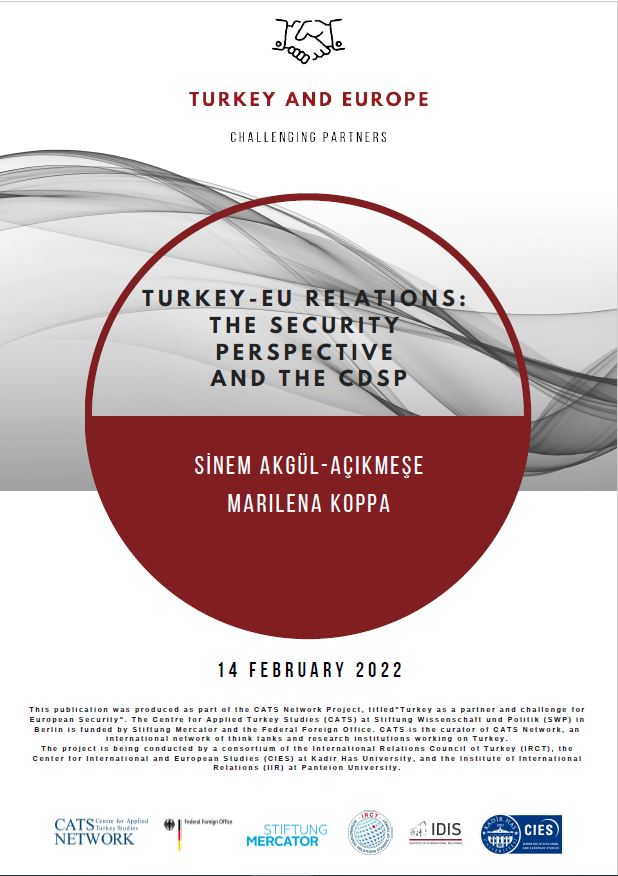
Security has always been one of the most significant determinants of Turkey’s relations with the European Union. A member of NATO for six decades, a candidate country to the EU, and one of the main actors in the shared neighborhood, i.e., the Black Sea, Southeast Europe and the Mediterranean, Turkey is/should be a ‘natural’ security partner for Europe. Nevertheless, Turkey’s security cooperation with the EU, and to some extent NATO’s relations with the EU, have been hamstrung because of the unresolved Cyprus issue, especially since the latter’s accession to the Union in 2004. Moreover, Turkey’s policies in recent years toward Syria, in Libya, and its security cooperation with Russia, have led to tensions and have become impediments to the progress of Turkey-EU partnership in the security and defense realms.

Sinem Akgül Açıkmeşe, Prof. Dr., Kadir Has University
Sinem Akgül Açıkmeşe is a Professor of International Relations and Jean Monnet Chair holder on Hybrid Threats in the EU at Kadir Has University (KHAS).She holds a BA in International Relations as well as an MA in European Union-International Relations from Ankara University. She studied at the European Institute of London School of Economics and Political Science (LSE) for her MSc degree in European Studies. She has completed her PhD in European Studies-International Relations at Ankara University (2008). She was a Jean Monnet fellow at LSE, Turkish Academy of Sciences fellow and visiting PhD student at London School of Economics, Sasakawa Young Leaders fellow, visiting scholar to IGCC-University of California-San Diego as a US Department of State Fellow, Black Sea Young Reformers fellow, visiting researcher at Stellenbosch University, visiting scholar at Harvard University (2017) in support of her research on Security Studies, EU foreign and neighbourhood policies specifically from a security perspective, European integration, enlargement and Turkey-EU relations. Prof. Açıkmeşe has a teaching experience of about 20 years, at various institutions including Ankara University and TOBB-University of Economics and Technology on a full-time capacity before she joined KHAS in 2011. She is currently the associate editor of European Review of International Studies,Governing Board Member as well as the Secretary-General of the International Relations Council of Turkey (IRCT) and served as a Member of the Governing Council of the International Studies Association (ISA) (2018-2020). She has coordinated and took part in several international research and exchange projects including EU-FP7 Marie-Curie Actions, Erasmus+ Strategic Partnerships and Jean Monnet Actions.

Marilena Koppa , Assoc. Dr., Panteion University
Marilena Koppa is an Associate Professor of Comparative Politics at the Department of European, International and Area Studies of Panteion University, and author of several articles on Balkan politics, minority issues, democratization, nationalism and European politics. Previously, she worked as a special adviser to the Hellenic Ministry of Foreign Affairs on issues pertaining to European integration and enlargement, and was a member of the European Parliament from 2007 to 2014. She was the Coordinator of the S&D Group at the Subcommittee on Security and Defense, Vice-chairperson of the EU-Turkey Joint Parliamentary Committee, member of the Committee on Foreign Affairs, substitute member of the Committee on International Trade and the Subcommittee on Human Rights, rapporteur of the European Parliament on “Implementation of the CSDP based on the Annual Report from the Council to the EU on the Common Foreign and Security Policy” in 2013 and on ‘Enlargement: policies, criteria and the EU’s strategic interests” in 2012. Her publications include “A Fragile Democracy: The Former Yugoslav Republic of Macedonia between the past and the future” (Papazisis, Athens, 1994), “The minorities in the post-communist Balkans” (Nea Synora-Livanis, Athens, 1997), “The creation of states in the Balkans” (Nea Synora-Livanis, Athens, 1997), “CSDP: the history, the institutions, the strategies” (Patakis, Athens, 2017), and “The Evolution of the Common Security and Defence Policy. Critical Junctures and the quest for the EU’s Strategic Autonomy” (Palgrave McMillan, London, forthcoming).

“The European Commission’s support for the production of this publication does not constitute an endorsement of the contents, which reflect the views only of the authors, and the Commission cannot be held responsible for any use which may be made of the information contained therein.”

